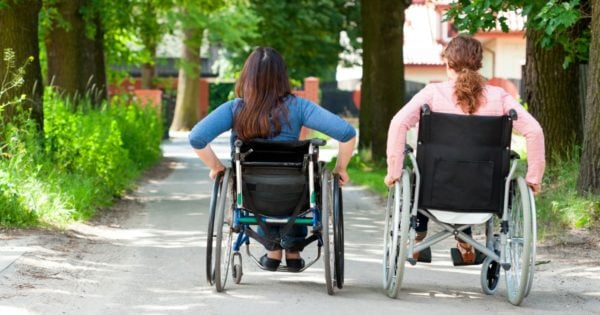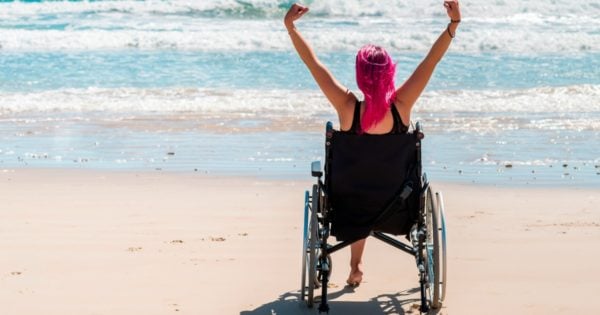Feeling body-positive when you have a disability.
When you hear the buzzwords “body shame” or “body positivity,” it’s common to think those phrases only apply to those who have a little extra junk in the trunk, but a huge demographic is excluded the conversation when it takes that cliché Christina Aguilera “We are Beautiful” turn.
As a woman with a physical disability, I am usually glaringly aware of how my body is the polar opposite of what is deemed the norm. I have had to answer, “What is that scar from?” from strangers seconds into an initial conversation, and have seen the words “anomaly” and “deformity” scribbled all over my medical chart.
It’s a weird feeling to feel such a huge disconnect from your body. I’ve never been diagnosed with a thick skin, but it has definitely been helpful in my circuitous path to self-acceptance.
But how did I get to this place where I can say, “This is me. Deal with it!”?
Well, first of all, let’s be clear: it’s unrealistic to expect that anyone can be a bastion of confidence every single day. The portrayals of disability you see in the media are rare, and when they exist, the portrayal is often tanned and athleticised and toned down considerably from the reality.

I don’t often see myself out there, so I have just accepted myself as is. I was born with a disease called congenital muscular dystrophy, and over the years, I have come to terms with the fact that when I look in the mirror or at pictures of myself, I’m not going to be 100 per cent in love with it all.
Sure, I can fool myself into thinking that 24/7, my body will only be viewed from the most flattering angles in golden hour lighting… but that’s not reality. I’ll see a candid photo of myself and suddenly realise my back looks contorted in a strapless dress the same way someone might despise a double chin. It happens.
Like most women, this is just another sock in the laundry list of things about my appearance that tend to wear on my nerves. For instance: I have scoliosis and a wide, uneven rib cage. Due to bone grafts and tendon transfers, my feet look like putting wedges. My spine is fused, so I can’t turn my head much, which sometimes puts off a definitive Frankenstein’s-monster vibe.
I have the muscle tone of a four month old. I have a tracheostomy scar on my neck from a medical emergency, so the head and neck I had always prized are no longer pristine.
Truly, if I wanted to torture my psyche by making a list, it could go on and on.
Watch the trailer for 'Embrace', a documentary about body image and how we're going to change the future for women and girls. Post continues after video.
Over the years, my body has led to so many negative feelings that it’s sometimes hard to find the other side of that coin. There are times I have worried that my attractiveness was non-existent, because if it was pointed out, it was often qualified with the clause “…for someone in a wheelchair.”
Hearing that you are pretty “for someone in a wheelchair” is a compliment that leaves a bad aftertaste. It is based on the assumption that most people with disabilities are mangled and mutated and the bottom of the pleasing-to-the-eye caste system.
This mentality is completely false. I know some foxy folks with disabilities. We are not few and far between; you just haven’t been looking.
Even if you come to grips with feeling yourself, sometimes you doubt that others will have the same perception. It’s embarrassingly unfortunate that I’ve doubted the mentality of men that find me attractive, wondering if something was amiss with them. It’s an inherent back-of-my-mind tickler that I’m not so proud of.
I have asked my current honey more times than is natural if he belongs to some fetish community. Insecurity and mistrust can be a standard-issue nuisance when you look different in any way, so you just have to do your best to keep those feelings at bay.
Otherwise, I’d spend every day in bed listening to Morissey and crying.
Living life from a seated position, a lot of things are figuratively and literally out of reach. Very often, we don’t have control over things in our lives, but self-perception and perspective are two things that I can take the reins completely on. It’s empowering as hell and a hugely important task.
When you come to accept your reality, stop comparing yourself to others, and learn to laugh at what you can’t change, you become a completely different person.

For me, the easiest solution has been to find other things to take pride in — things I had some control over, or which I could take full ownership of. I feel that shying away or hiding in the shadows or fixating on my golf-wedge feet or Frankenstein neck is sending the wrong impression — not only of me, but also of people with disabilities in general.
The rest kind of fell into place once I accepted that even in a slightly atrophied, bony, or kind of weird-looking form, I am pretty happy with me. I like my eyes and my freckles and I even like that I am less than five feet tall.
Not to get all Christina Aguilera on you, but you can’t bring me down today. (Ok, I told you I wouldn’t get all Xtina on you, but I just can't help it. Sorry.)
This article by Kimmie Jones first appeared on Ravishly.com, your first stop for feminist hugs.
Also from Ravishly:
Why This Cis Girl In A Wheelchair Cares About Bathroom Bills
I’m Overweight And Get Fat-Shamed When I Exercise
4 Things You Should Ask Yourself Before Sharing Inspiration Porn On Social Media
Top Comments
I have congenital muscular dystrophy too (bethlem myopathy) and can relate so much to everything you wrote! I really loved reading your article as it was so similar to my experiences it almost felt like I was reading something I wrote haha :)